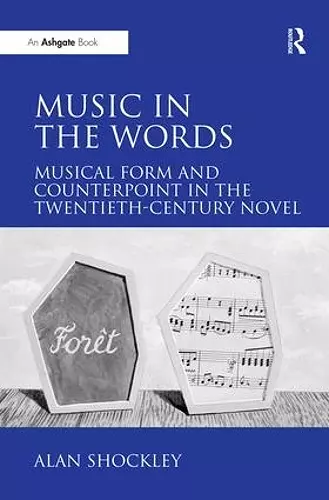Music in the Words: Musical Form and Counterpoint in the Twentieth-Century Novel
Format:Hardback
Publisher:Taylor & Francis Ltd
Published:28th May '09
Currently unavailable, and unfortunately no date known when it will be back
This hardback is available in another edition too:
- Paperback£56.99(9781138259805)

There is a strong tradition of literary analyses of the musical artwork. Simply put, all musicology - any writing about music - is an attempt at making analogies between what happens within the world of sound and language itself. This study considers this analogy from the opposite perspective: authors attempting to structure words using musical forms and techniques. It's a viewpoint much more rarely explored, and none of the extant studies of novelists' musical techniques have been done by musicians. Can a novel follow the form of a symphony and still succeed as a novel? Can musical counterpoint be mimicked by words on a page? Alan Shockley begins looking for answers by examining music's appeal for novelists, and then explores two brief works, a prose fugue by Douglas Hofstadter, and a short story by Anthony Burgess modeled after a Mozart symphony. Analyses of three large, emblematic attempts at musical writing follow. The much debated 'Sirens' episode of James Joyce's Ulysses, which the author famously likened to a fugue, Burgess' largely ignored Napoleon Symphony: A Novel in Four Movements, patterned on Beethoven's Eroica, and Joyce's Finnegans Wake, which Shockley examines as an attempt at composing a fully musicalized language. After these three larger analyses, Shockley discusses two quite recent brief novels, William Gaddis' novella Agapé Agape and David Markson's This is not a novel, proposing that each of these confounding texts coheres elegantly when viewed as a musically-structured work. From the perspective of a composer, Shockley offers the reader fresh tools for approaching these dense and often daunting texts.
'With Music in the Words, Alan Shockley brings the ecumenical sensibility of a highly literate composer to the analysis of modern literary works that emulate musical forms and techniques. Much pondered passages by Joyce are given bracing new performances, while lesser-known experimental works are generously ushered back onto the stage, where they sound like never before. By examining the ways in which literature "aspires to the condition of music," Shockley recalibrates and enriches our reception of both art forms.' Scott Burnham, Professor of Music, Princeton University, USA 'The relationship between music and modern prose fiction has long been one that deserved closer attention. In this book, Alan Shockley has succeeded in presenting a fascinating examination of this relationship, in accessible yet scholarly language. This study is a major and original contribution to the field, eclectic in its scope, and rigorous in its analysis.' Rob Spence, Associate Head, Department of English and History, Edge Hill University, UK 'Alan Shockley‘s book is an extraordinarily informed and engaging study of musical form in literature, a study that moves well beyond the usual exploration of the thematic or metaphorical relevance of the bits of music alluded to or quoted within a literary work, engaging the actual musical techniques (such as counterpoint) and structures (such as sonata or fugue) that novelists employ to create their verbal narratives. Shockley‘s extended discussion of the musicality of the Sirens episode of Joyce‘s Ulysses is a tour de force that will become required reading for Ulysses scholars.' Charles Rossman, Professor of English, University of Texas at Austin, USA '... [an] exciting new study... Shockley's book is a significant contribution to a burgeoning field, a valuable book for Joyce and Burgess scholars, and a tribute to Ashgate's series on the relationship between text and music over the last two societies.' Ars Lyrica
ISBN: 9780754661993
Dimensions: unknown
Weight: 453g
206 pages